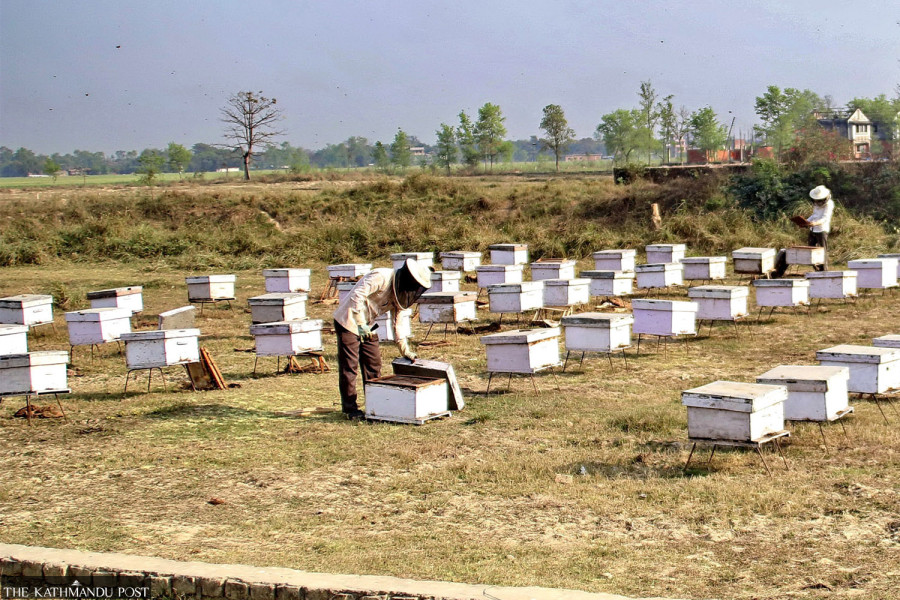Money
Poisoning from farm pesticides stuns beekeepers
Bees not only produce honey; they are also crucial to the food supply, pollinating hundreds of crops.
Madhav Aryal
Mina Karki from Dekuldanda in Ribdikot rural municipality, Palpa, has been engaged in beekeeping for 30 years. But recently, with the rising use of pesticides in commercial farming, she has been facing the problem. Bees are dying or fleeing.
Most farmers are worried because honeybees are crucial to the food supply, pollinating over 100 crops. Reports say that three-fourths of the world's flowering plants and about 35 percent of the world's food crops depend on animal pollinators to reproduce.
Karki, who has been doing beekeeping with the support of her husband, has more than 25 hives.
She earns Rs60,000 annually and is motivated to earn while staying at home.
“But dying bees have troubled many people like me,” said Karki. “I’ve been in the beekeeping business for three decades. This problem was rare.”
Hom Bahadur Bhattarai of Bhairavsthan of Ribdikot has at least 35 hives. He has seen bees flying away. The hives have shrunk due to deaths as well.
The Bhattarai couple said the problem became severe in the past couple of years.
After generating a good income, Bhattarai added hives. He extracts honey three times a year. He assumed that the haphazard use of pesticides in vegetable and chilli farming has started impacting beekeeping.
Nara Bahadur Palli of Jhadewa in Mathagadhi rural municipality has bee hives, around 90, on his terrace.
He has been keeping traditional wooden hives for seven decades. Palli’s source of income is honey produced in the hives. But he is facing the same problems as Karki and Bhattarai.
“Nobody has taken an initiative to solve the problem,” said Palli.
Small investments, less hard work, and good benefits made beekeeping lucrative for many villagers. What threatens the occupation’s sustainability is that beekeepers do not receive technical and promotional support from the government.
“Who will help us?” questions Palli. “I have been doing it on my own. I go to Tarai to sell the honey, and I am fine with that.”
The subsidies provided by the government are gobbled up by those who are clever and have direct access to it, said Palli.
Customers now reach farmers’ homes to buy honey, so there is no problem with sales.
However, problems with beekeeping have only compounded.
“I used to make at least Rs150,000 from honey a year. But, recently, there are no bees in half the hives,” said Palli. “Bees are disappearing. Most hives are empty. Even others have fewer bees.”
Farmers are unable to stop bees from dying or fleeing. Though they have tried to retain the bees, nothing seems to be working.
Farmers say long dry spells of winter, lack of bee pasture and excessive rainfall were also the reasons behind the declining bee populations.
Marmara in Palpa is a good bee pasture area. Agriculture technicians said honey can be extracted three to five times in this area.
Palli said that though he could save bees from other wild insects and pests, he failed to save them from dying due to the excessive use of harmful chemicals.
Santosh Kumar Chaudhary, an agri expert and acting chief of the Agriculture Knowledge Centre, said that due to the impact of climate change, pests have been increasing, and farmers are applying more pesticides.
“Recently, village farmers have started using pesticides on vegetables, fruits, and round chillis. But no one is aware of its direct and indirect impact.”
Haphazard use of pesticides has not only made people suffer from diseases but also hugely impacted bees, Chaudhary said.
The Agriculture Knowledge Center has removed subsidies for beekeepers.
With the failure of the Smart Krishi Programme operated in Marmara of Jhadewa, Mathagadhi rural municipality by the Lumbini province, the government has allocated funds only for general training.
Chaudhary said beekeepers had not been informed about the problem.
However, according to the Agriculture Knowledge Centre, farmers’ use of pesticides for commercial farming might have impacted bees.
With or without government support, farmers are earning well from beekeeping and are commercialising beekeeping at low costs.
The government data shows there are more than 20,000 bee hives in Palpa.
If the processing, packaging, and market management can be done with less pesticide use, farmers can be more commercial and earn more, said an agri expert.




 14.12°C Kathmandu
14.12°C Kathmandu













